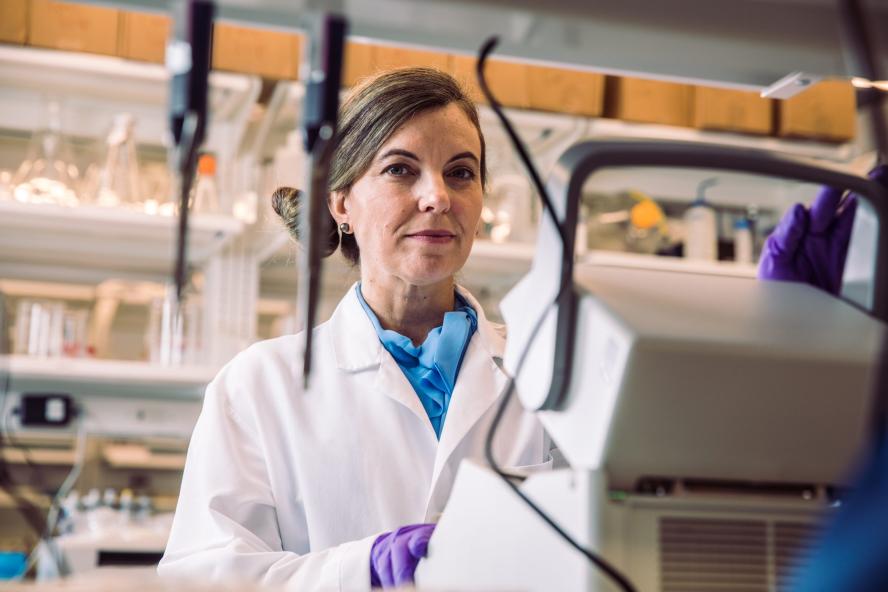-
About
- Leadership & Faculty
- News & Events
-
Academics
- Graduate
- Advanced Clinical Training
- Continuing Education
-
Student Life
-
-
Accommodations
- Our Campus
-
Accommodations
- Graduate Resources
-
-
Research
-
Hospitals & Clinics
- Emergency Care
- Hospital Services
-
Community Outreach
- Volunteer
Investing in Research, Amanda Martinot Wins 2021 Junior Faculty Research Award
Awarding and encouraging faculty at the beginning of their career to continue their cutting edge research.

One of the highlights of Cummings School’s Veterinary Research Day, held on October 6th this year, is the presentation of the Junior Faculty Research Award. The award honors a promising faculty member who is in the relative beginning of their career and engaged in cutting-edge research with a local or global impact. This year’s award went to assistant professor Amanda Martinot, a veterinary pathologist specializing in animal models of infectious diseases and vaccine development.
As a new co-Director and primary pathologist for Cummings School’s Comparative Pathology and Genomics Shared Resource, Martinot was involved in pre-clinical work evaluating the efficacy of the Johnson & Johnson COVID-19 vaccine in non-human primates as part of a collaboration with the Barouch lab at Beth Israel Deaconess Medical Center. “It’s been very exciting to be involved with COVID-19 vaccine research,” says Martinot, who continues to work on evaluating the vaccine’s effectiveness against new COVID variants using both hamster and non-human primate models.
The bulk of Martinot’s independent research is focused on developing a new tuberculosis (TB) vaccine. Currently, the only vaccine that is approved for use is the BCG vaccine, based on an attenuated strain of Mycobacterium Bovis, a type of mycobacteria that infects cows. “BCG is not very good in the sense that it only prevents some types of TB in young children, while most of the TB that we see around the world occurs in adults,” says Martinot. “What my lab has been doing has been going back to the starting point with TB vaccines and building and improving upon the things that we think help BCG work. We are not only evaluating the vaccine’s efficacy in animal models, but my lab is actually making a portfolio of whole-cell vaccines as well.”
There are whole-cell TB vaccines that are farther along in clinical development, Martinot points out. Unlike COVID-19 vaccines that are based on stimulating the immune system with just one piece of a pathogen, a whole-cell vaccine uses the entire pathogen, but a version of the pathogen that doesn’t make people sick, similar to first-generation polio vaccines. Martinot points out that in TB vaccine development, “much like what’s happening with the COVID 19 vaccines, there’s multiple vaccines being developed at the same time, and whole-cell vaccines are one part of a larger group of vaccine modalities being developed.”
Martinot recently received a $1 million grant from the Bill and Melinda Gates Foundation to continue her work on the TB vaccine. She is also the recipient of an $850,000 K08 award, granted by the National Institutes of Health (NIH) to provide salary support to junior faculty as they’re finishing up a Ph.D. or a fellowship as they transition to independence as a principal investigator.
As for Cummings School’s Junior Faculty Research Award, Martinot says she is honored to have received it. When the pandemic hit shortly after she started her faculty position, all research was effectively shut down and all personal protective equipment was designated for people that were actually handling COVID-19 patients.
“It was really stressful to think about all the things that were happening in the world and not be able to actually get into the laboratory to do research,” says Martinot. “I’m grateful and thrilled that I was able to shift gears so dramatically and contribute to the COVID-19 vaccine development and stay productive in that time when a lot of faculty members were struggling to be able to do anything at all. To be able to then jump back in and hit the ground running, generate data for TB vaccine development, and secure a significant grant to continue that work, feels like a major accomplishment. I’m very proud to be recognized for the work that we’ve been able to accomplish under those really harsh conditions by the university where I’m a new faculty member.”
Cheryl London, Associate Dean for Research and Graduate Education, calls Martinot and her achievements “phenomenal.”
“She works in the infectious disease space, and she has expertise in immunology and infectious disease and pathology and [also] worked as an investigator on the J & J vaccine development,” says London. “She’s one of these people that’s amazingly productive. She has a really bright future and we’re so proud to have her at Cummings school.”
Department:
Dept. of Comparative Pathobiology